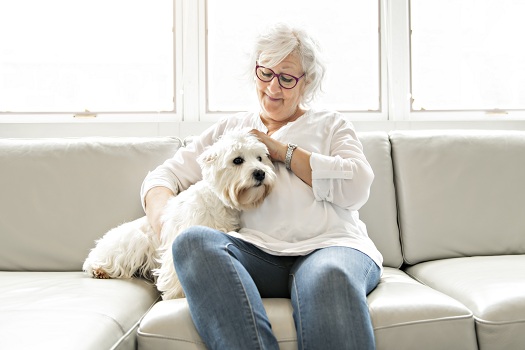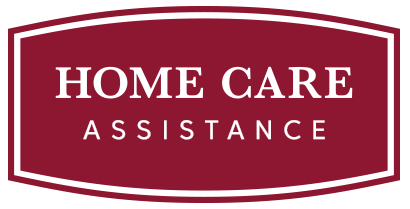How to Soothe Anxiety in the Elderly

When your senior loved one is worried and distraught, restoring his or her equilibrium can be challenging, particularly if he or she has dementia. Although anti-anxiety medication is an option, many alternatives exist that lack the side effects of prescription drugs. Some techniques are preventive, while others melt tension in the blink of an eye. Here are proven ways to manage anxiety in the elderly, a few of which may surprise you.
Use Aromatherapy
Aromatherapy is the use of plant extracts called essential oils to promote wellness of the mind, body, and emotions. Certain essential oils excel at bringing calmness. Those ideal for seniors are bergamot, chamomile, clary sage, frankincense, geranium, lavender, rose, and vetiver. Inhaling these scents launches beneficial body responses, one of which is releasing serotonin. This brain chemical, called a neurotransmitter, induces joy and tranquility.
One aromatherapy method is scenting the air with a diffuser, and one simple design is a reed system consisting of skewers arranged in a vessel of essential oils. With a wicking action, the reeds draw up the oils and disperse their perfume. Another option is steam dispersal. Add five drops of essential oil to a bowl of hot water, placing it a safe distance from your loved one. For widespread coverage, you can buy a machine diffuser, either nebulizing, evaporative, heat, or ultrasonic. Or give your loved one a vial of his or her favorite oil to sniff at will, unless he or she has dementia. In that case, tuck a treated tissue into his or her collar or sleeve. Aromatherapy can also help your loved one sleep. About 15 minutes before bedtime, sprinkle his or her pillowcase with three drops of lavender oil.
Encourage Humming
In 2011, Swedish scientists found that humming relieves sinus blockages while evoking tranquility. Humming produces a “relaxation response” with therapeutic effects for several body systems. As breathing and heart rate slow, panic evaporates. Blood levels of stress hormones plunge. Simultaneously, the body floods with endorphins, chemicals that spur happiness and alleviate pain. While blood pressure drops, muscles lengthen and relax. The effect of humming on breathing is astounding. At rest, the average respiratory rate is 15 breaths per minute. Humming reduces the rate to five breaths per minute.
All it takes to feel grounded is a few minutes of humming, which involves closing the lips and making an “mmmm” sound through the length of the exhalation. Your loved one can either make random sound vibrations or hum favorite tunes. Demonstrate this technique for your loved one and encourage him or her to hum when fear arises.
Anxiety is one of many components that can contribute to decreased mental and physical health in seniors. Not every senior has the same care needs, which means they don’t all need the same type of senior home care. Dallas families can rely on Home Care Assistance to provide individualized care plans to meet their elderly loved ones’ unique care needs. Our holistic Balanced Care Method was designed to help seniors focus on healthy lifestyle habits such as eating nutritious foods, exercising regularly, and maintaining strong social ties, and our Cognitive Therapeutics Method offers mentally stimulating activities that can stave off cognitive decline and delay the onset of dementia.
Suggest Coloring
Coloring is a relaxation technique that works by subduing the amygdala, the brain region that reacts to perceived threats. While coloring is usually associated with children, adult use originated in the early 1900s. Psychologist Dr. Carl Jung would prescribe coloring as a calming treatment. Since then, more doctors are suggesting this practice.
When coloring, your loved one may enter a serene state similar to meditation. Choosing hues and shading objects can focus the mind, providing a reprieve from worry. Repetitive and rhythmic strokes increase hand-eye coordination while causing the brain to release serotonin. Over time, coloring regularly can boost confidence and alertness.
Two books recommended for starting a coloring hobby are Stress Relieving Floral Designs and Mandalas and Geometric Shapes. If your loved one has dementia or Alzheimer’s disease, you’ll find a broad selection of books online for people with cognitive loss. For optimal benefit, include 20 minutes of coloring in your loved one’s daily schedule. Rather than providing crayons, buy colored pencils, which are easier to manipulate.
Play Soothing Music
Like humming, certain music genres invite a relaxation response. Most effective are classical and instrumental melodies. Especially therapeutic is slow music featuring the flute, piano, or acoustic guitar. At home, create a relaxed ambiance by keeping a radio tuned to an easy listening station. YouTube has countless music selections. If your loved one owns a computer, you can bookmark his or her favorite scores for quick access. For use away from home, download serene melodies to an MP3 player. Then, before leaving the house, pack the device and headphones for your loved one. With this preparation, you’re ready for any stressful situation, such as a medical exam. Another option is playing joyful tunes from your loved one’s youth. Whenever you see signs of anxiety in your loved one, croon nostalgic songs, such as “You Are My Sunshine.” He or she will be smiling in no time.
Seniors with high anxiety levels could develop serious illnesses, making it a challenge to care for themselves independently. Living independently is important for seniors who want to maintain a high quality of life. For some, this simply means receiving help with tasks that have become more challenging to manage over time. Even when families have the best intentions, they may not have the time to provide the care their elderly loved ones need and deserve. If your loved one needs help for a few hours a day or a few days a week, reach out to Home Care Assistance, a trusted provider of respite care Dallas seniors can depend on.
Consider Pet Therapy
The affection of a loving animal relieves stress instantly. In particular, dogs and cats make beloved friends, their constant companionship imparting security. Since such pets are sensitive to human behaviors and feelings, they can be warmly responsive, easing loneliness. Pet ownership bestows many physical benefits. Just a few minutes of petting an animal triggers a surge of endorphins, relieving pain and worry. Simultaneously, serotonin rises and blood pressure drops. In a study conducted by the University of California Davis, seniors with Alzheimer’s grew markedly calm during weekly training sessions with dogs.
Caring for a cat or dog ensures daily smiles and laughter. Contributing to the health of an animal builds confidence, and feeling needed heightens self-worth. If adopting a dog or cat for your loved one isn’t feasible, consider buying an aquarium and tropical fish. Watching their graceful swimming can be wonderfully soothing. Also therapeutic is listening to water bubbling through pumps and filters. Medical practices often have aquariums in their waiting rooms for these reasons.
Try Cognitive Behavioral Therapy (CBT)
For severe anxiety, consider this form of talk therapy. Signs your loved one may need therapy include panic attacks, depression, insomnia, headaches, poor digestion, and suicidal thinking. CBT is conducted by mental health professionals with expertise in promoting an optimistic outlook. Typically, this involves correcting erroneous perceptions of oneself and false assumptions about situations. A CBT practitioner can give your loved one tools and techniques to handle anxiety. One method is reframing situations, seeing their positive aspects. CBT sessions are goal directed, solution based, and highly interactive. Since results can be quick, therapy is often short-term, averaging 16 appointments.
Anxiety can result in mental, emotional, and physical challenges for aging adults, but they don’t have to manage them alone. In Dallas, elderly care agencies can be a great boon to seniors. With the help of the caregivers at Home Care Assistance, your aging loved one can lead a happier and healthier life. We offer a revolutionary program called the Balanced Care Method, which encourages seniors to eat nutritious foods, exercise and socialize regularly, and focus on other lifestyle factors that increase life expectancy. To create a customized home care plan for your loved one, call Home Care Assistance at (214) 363-3400 today.

